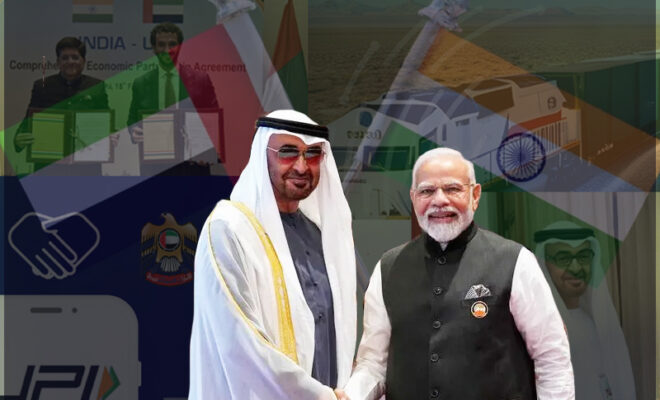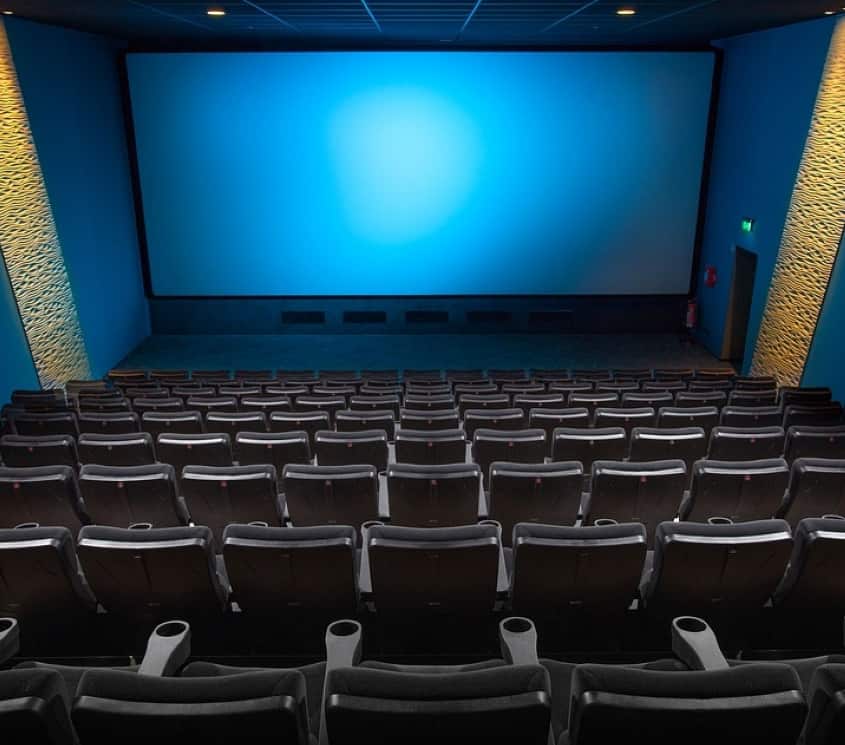India-UAE Present Strong Model Of Cooperation In The 21st Century

Despite global conflicts & challenges, India and UAE stand as strong models of cooperation and progress, showcasing a peaceful & progressive path to the world.
On one side, countries like Russia and Ukraine have been at war for years. Countries like America, Britain, and China face various challenges, while others, such as India and the UAE, are setting examples for the world.
The relationship between the UAE and India is a prime example of how two countries, despite differences in size, culture, and geography, are forging a strong and mutually beneficial partnership.
These two nations have built their cooperation on the foundation of shared values and common interests.
India & UAE Cooperation in Economy & Trade
One of the cornerstones of the UAE-India relationship is their economic collaboration. The UAE is India’s third-largest trading partner, with bilateral trade consistently exceeding $60 billion annually. This partnership extends across various sectors:
CEPA: Comprehensive Economic Partnership Agreement
In February 2022, India and the UAE signed a Comprehensive Economic Partnership Agreement (CEPA), marking a significant milestone in their trade relationship.
The CEPA aims to elevate bilateral trade to an impressive $100 billion over the next five years. It’s designed to promote economic growth in both countries by removing barriers to trade and investment.
So basically, CEPA is an agreement between India and the UAE that aims to boost their economic relationship. It involves getting rid of tariffs on most goods traded between the two countries, making it easier to do business.
They also want to encourage investment and protect intellectual property rights. Additionally, they plan to cooperate in areas like science, technology, education, and tourism.
UAE Participation In G20, Hosted By India
The UAE’s participation in the G20 summit hosted by India underscores its growing importance in the global economy.
The summit covered a wide range of critical issues, including the global economic recovery, climate change, energy security, food security, digital transformation, and counter-terrorism.
The UAE is going to be a big player in a few different areas. They’re going to share their experience in dealing with COVID-19, which is pretty relevant right now.
They’re also committed to reducing their emissions to zero by 2050, which is a big deal for the environment. They’re a major producer of oil and gas, so they’ll be talking about that too.
Railways Agreement for Economic Corridor
The India-UAE Railways agreement is a game-changer in terms of connectivity and economic development. This project aims to establish a high-speed rail network connecting major Indian cities like Mumbai, Delhi, and Chennai with key UAE cities such as Dubai and Abu Dhabi.
The economic corridor created by this agreement will facilitate the faster movement of goods and people, boosting trade and investment between the two nations.
Dedollarization: Oil Trade In Indian Rupees
A significant shift occurred in India-UAE relations with the decision to trade oil in Indian Rupees instead of the US Dollar.
This will reduce India’s dependency on the US Dollar, promote the use of the Indian Rupee in international trade, and strengthen economic ties between the two nations.
In August 2023, Indian Oil Corporation (IOC) made history by conducting the first rupee-denominated oil trade with Abu Dhabi National Oil Company (ADNOC).
This strategic shift benefits both countries by promoting financial cooperation and reducing trade deficits.
Connection of Indian UPI & UAE’s IPP
The Reserve Bank of India (RBI) and the Central Bank of the UAE (CBUAE) signed a memorandum of understanding (MoU) to link India’s Unified Payments Interface (UPI) with the UAE’s Instant Payment Platform (IPP).
This linkage enables fast, secure, and convenient cross-border fund transfers between the two nations. It simplifies financial transactions for individuals and businesses, promoting economic cooperation.
This will reduce the cost of cross-border payments, improve payment system efficiency, and enhance financial inclusion.
Cultural, Educational & Tourism Exchange
The UAE and India have also established strong cooperation in the fields of tourism, education, and culture.
1. Tourism
The UAE is a desirable destination for Indian tourists. In 2021, over one million Indians visited the UAE, and this number is expected to grow.
Both countries have signed agreements, such as the establishment of a joint tourism office in India, to further promote tourism exchanges.
2. Education
With over 250,000 Indian students studying in the UAE, educational exchanges are thriving. The UAE offers high-quality education, attracting Indian students due to its affordability and excellence.
Educational collaborations, including the establishment of an Indian School in Dubai, further strengthen this partnership.
3. Cultural Alliances
Cultural exchange between India and the UAE is rich and ongoing. The UAE is home to a vast Indian community, contributing to the country’s cultural diversity.
Indian cultural events and festivals are celebrated with enthusiasm in the UAE. Cultural alliances and memorandums of understanding (MoUs) have been signed to deepen cultural ties.
Also Read:- Why Did The World Prefer India’s IMEC Corridor Over China’s BRI?
Aviation Deals and Connectivity
Connectivity between India and the UAE has seen significant expansion, marked by a rise in flight routes, numbers, and frequencies.
In 2022, both countries signed an agreement to increase the number of weekly flights between them from 120 to 160. This agreement fosters tourism and business interactions.
Furthermore, Etihad Airways announced plans to set up a hub in Mumbai, the first time an Emirati airline has established a hub in India.
India’s IIT In Abu Dhabi
The recent announcement of an Indian Institute of Technology (IIT) branch in Abu Dhabi underscores the UAE’s commitment to fostering educational excellence.
This branch will be the first overseas campus of the prestigious Indian Institutes of Technology (IITs). It will be situated in the sustainable city of Masdar in Abu Dhabi, offering a wide range of engineering, science, and technology programs.
UAE Builds Hindu Temples For Large Indian Diaspora
The UAE hosts one of the largest Indian diasporas globally, with over 3.5 million Indians contributing to the country’s growth. One remarkable symbol of the UAE’s respect for Indian culture is the construction of Hindu temples.
The UAE has built several temples, including –
- BAPS Shri Swaminarayan Mandir in Abu Dhabi
- Iskcon Krishna Temple in Dubai
- Shree Maha Mariamman Temple in Sharjah
- Shri Sithakali Amman Temple in Ajman
These temples provide a spiritual and cultural anchor for the Indian diaspora in the UAE, boosting cultural diversity and interfaith harmony.



